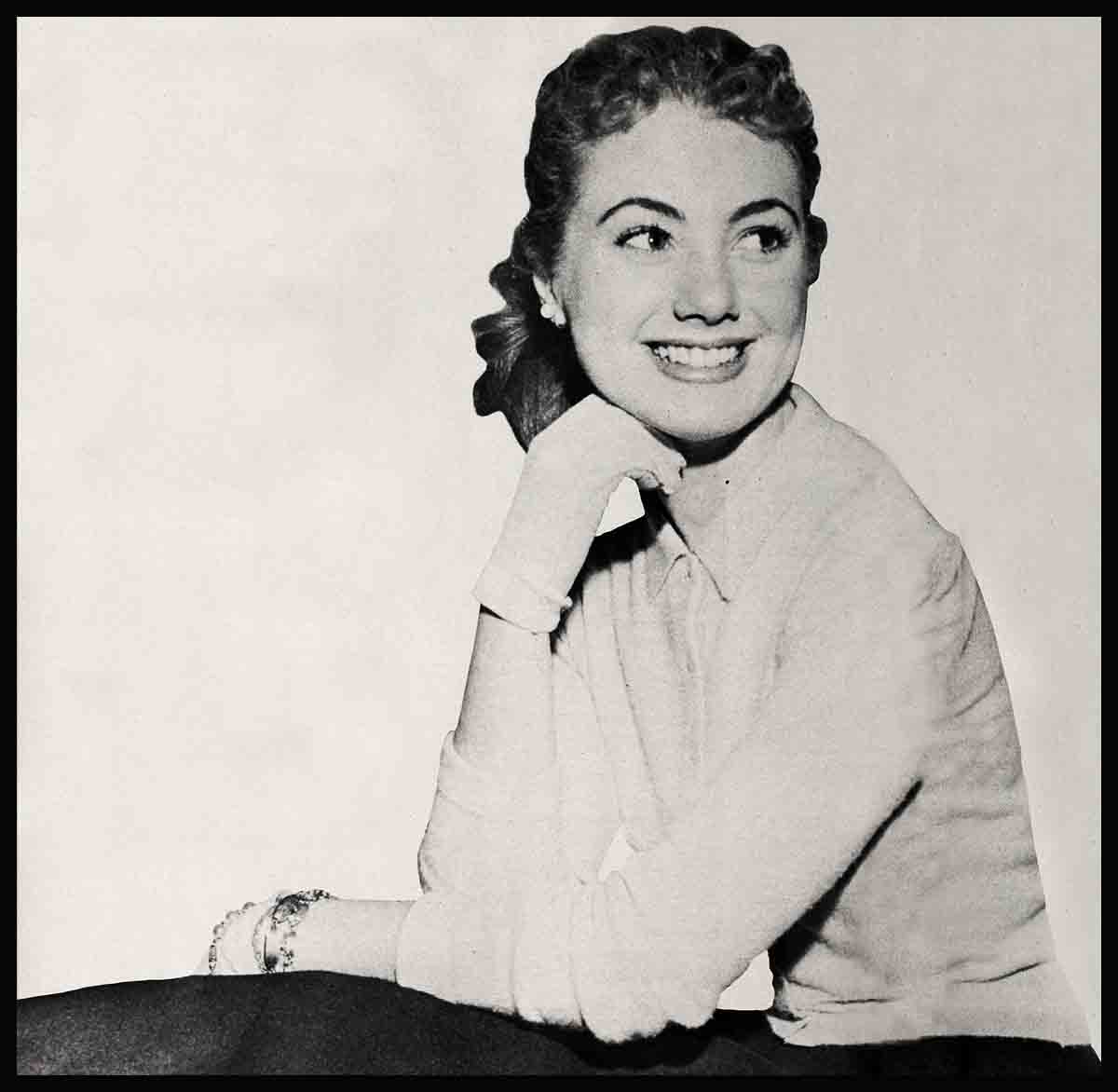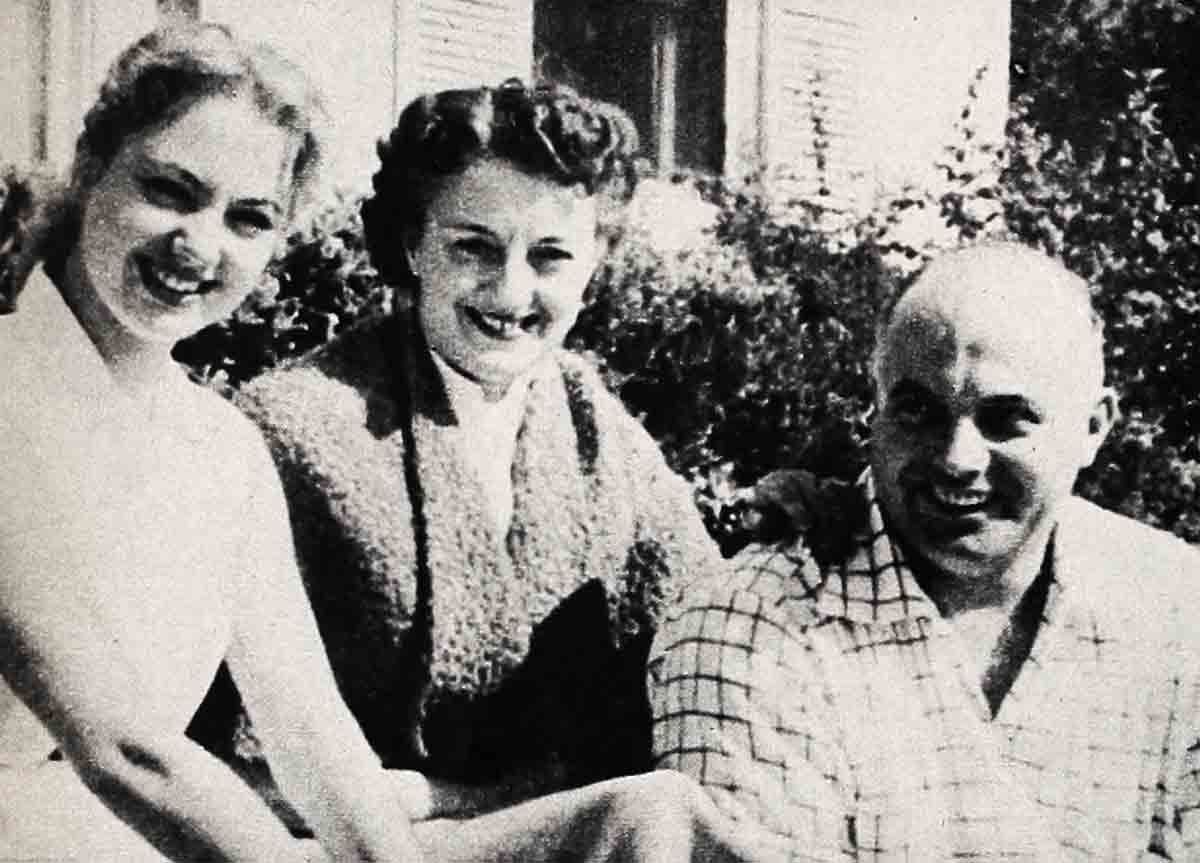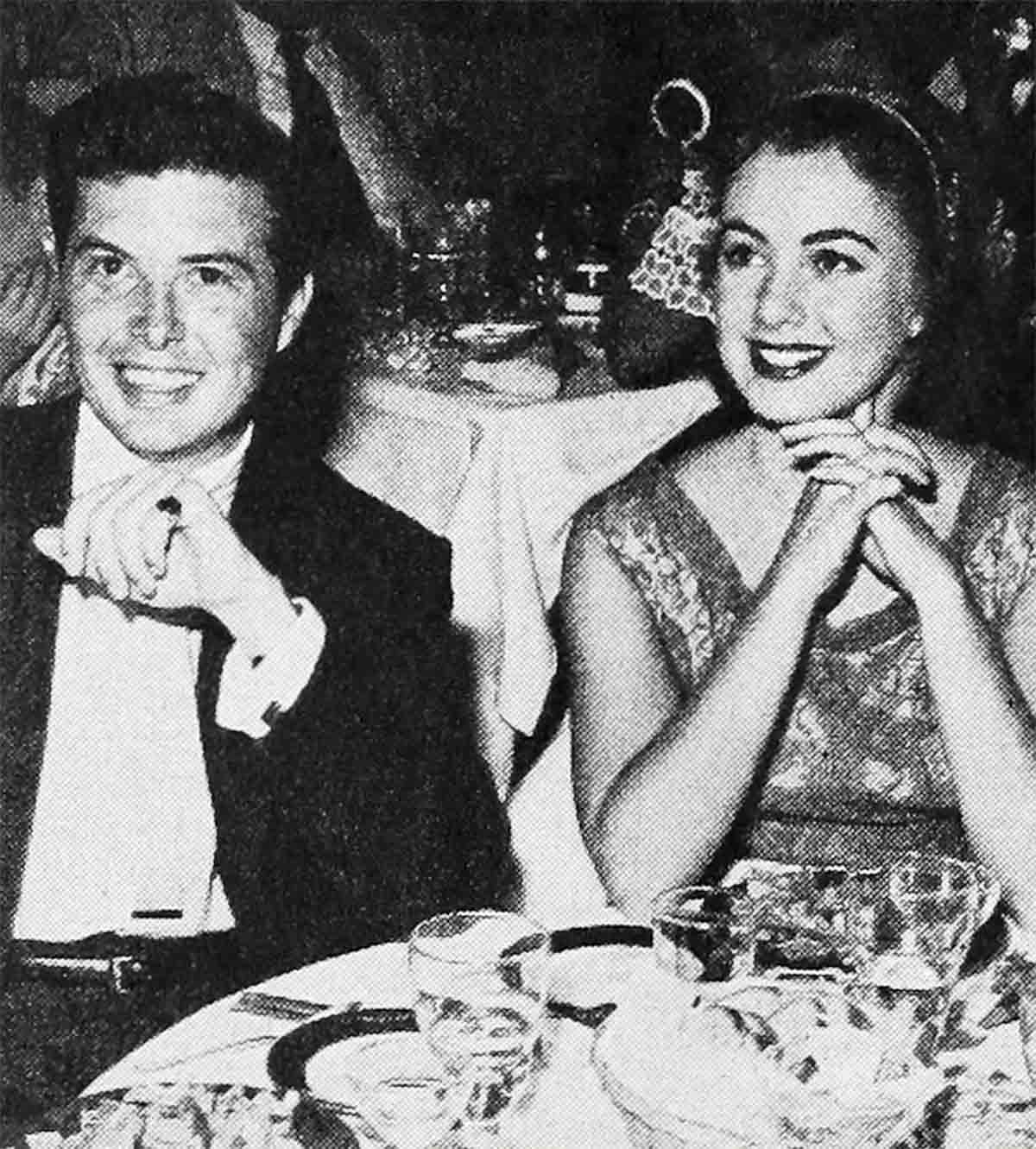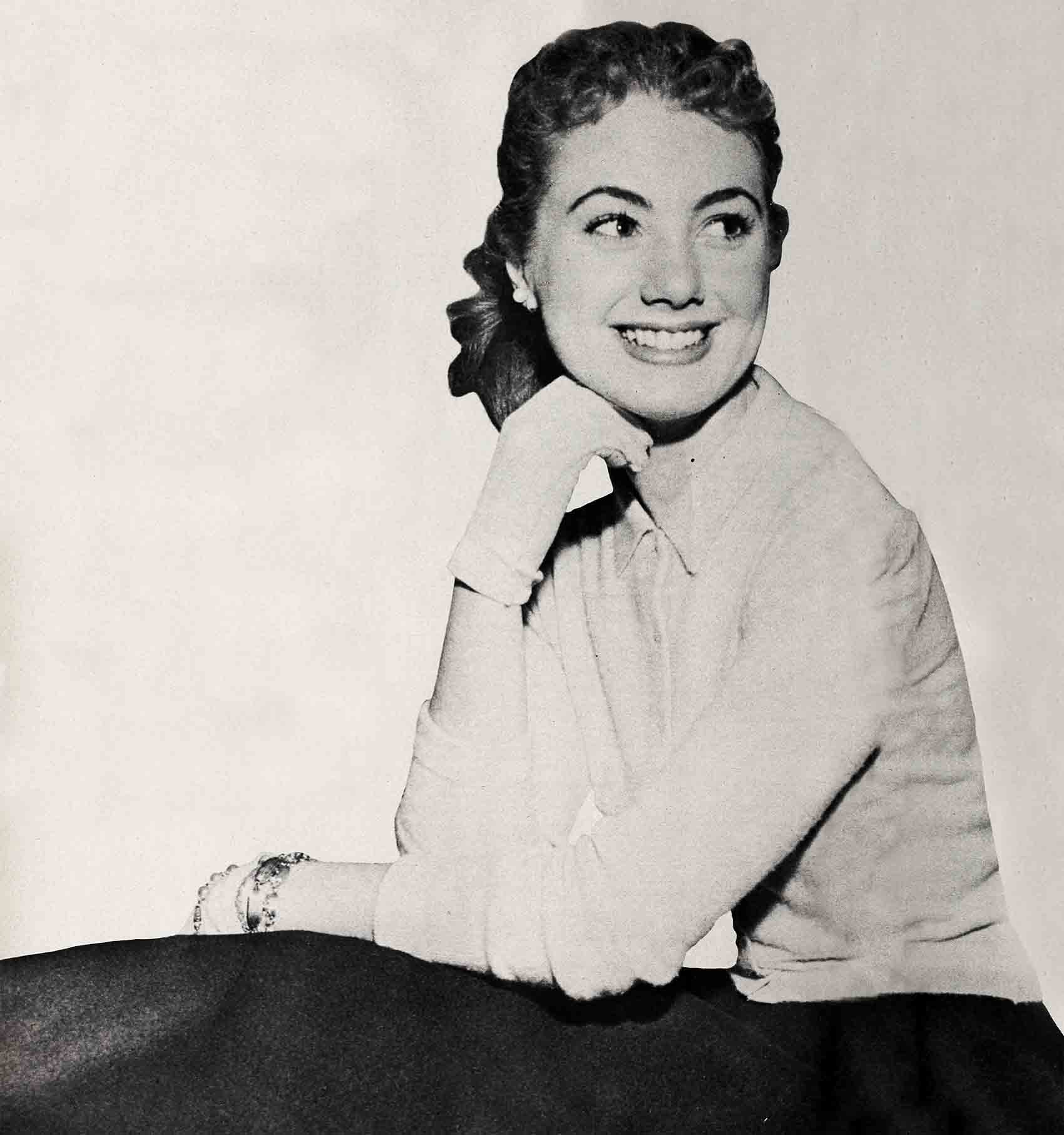
Everything’s Going Her Way—Shirley Jones
The dock was sheer madness. Photographers rushed and stumbled about the gangplank, sending off a steady flash of light bulbs; someone pushed through with four huge bouquets of roses, and fans shoved in more anxiously as a gang of reporters, in some five languages, started shouting to the four women descending the gangplank. The last—a sunny-faced, scrubbed-looking young blond—took one look and stopped in awe. Then, regaining her usual composure, she followed her three illustrious companions, managed the plank without a fumble. Everyone agreed, it was an admirable performance for a twenty-one-year-old from Smithton, Pennsylvania. who two years before was an unknown.
Later, speeding through the streets of Paris in .a slick black official limousine, Shirley Jones’ natural enthusiasm burst through. “Yipes, how could this be me?” she repeated in dizzy disbelief. “Me in Paris, with Helen Hayes, Judith Anderson and Mary Martin!” How this could be is, indeed, a Cinderella story.
All stories have a beginning and Shirley’s begins somewhere in Pennsylvania, in a small mining town, just outside Pittsburgh. The town, Smithton, boasts lazy lawns, a small-size grocery and a good-size brewery. The brewery—Stoney’s—belongs to Shirley’s dad and his four brothers. Life for Shirley began one bustling spring day, March 31, 1934, and until two years ago, centered completely around this homespun community of eight hundred people.
In a comfortable fourteen-room clapboard house that Grandfather Jones had built for his family of ten children, Shirley lived with her mother, dad and Grandmother. She grew up with the smell of homemade bread baking on Saturdays, the excitement of huge family get-togethers on Sundays.

Even today, spend ten minutes with Shirley and she’s telling you about Smithton and her eighty-three-year-old grandmother.
“I’ve been told Granny really brags a lot about me to the neighbors,” Shirley laughs. “But when I’m around she won’t let on that she cares one bit that I’m in movies. She insists I do all my old chores, too. Secretly, I think, she feels this will prevent me from becoming spoiled!”
Shirley’s famous now, has finished “Oklahoma!” is making “Carousel,” but her old room is always kept ready. Every free weekend she has, she’s packing and riding the rails back to Smithton. “Back to the folks, old friends and beaux and to church,” she says. As you may have guessed already, Smithton holds many pleasant memories.
Unlike most girls who get an early start in show business, Shirley can honestly say, “I grew up like millions of other American girls.” She was an excellent student—admitting a little difficulty with math—made national honor society, captained the basketball and softball teams and put in her supply of school spirit as drum majorette and cheerleader. These were warm, unclouded sunny years, un-warped by driving ambition or toil.
“I’ve always wanted to be on the stage and in movies,” Shirley will admit, somehow still amazed that her dreams came true. “It’s the only thing I ever dreamed of and there was never anything else I wanted to do.” The way Shirley’s dad remembers, Shirley actually started singing before she learned to talk, began to take formal voice lessons when she was twelve. “Singing’s always been as natural to me as breathing,” says Shirley, who still looks upon her singing as kind of a hobby.

Although shy, as a kid, there was no problem coaxing Shirley to perform for family or friends. She thought it only natural to sing. On Sundays she sang in church, and in school she could always be counted on to give recitals or participate in dramatic shows.
“Nobody in our family has ever had any tendency toward the theatrical,” Shirley explains, in gratitude to her family. “But Mother and Dad have always been wonderful about my hopes. They felt it was important that I did what I wanted to do—and that I did it well.”
During high school, Shirley studied singing part-time at the Pittsburgh School for Dramatic Arts. Upon graduation, she won a two-year scholarship to Pittsburgh, and began studying acting, dancing and voice in earnest, appeared in several productions of the Pittsburgh Light Opera Company. “I played Ethel Hofflicker(the lead) in ‘Best Foot Forward,’ and was in ‘Three to One,’ ‘Dance for Joy’ and others. Through my work with the Company, I met Ken Welch, who was then musical director,” Shirley explained. Ken Welch was to become the most important person in Shirley’s career, even after he left Pittsburgh for New York.
“My folks took me to New York on a holiday,” Shirley remembers rather happily. “While we were there, we went to see Ken and he asked me to sing.”

“I was amazed at the rapid progress she made in the few months since I’d last seen her,” Ken Welch said. “I asked her to work with me for a few afternoons while in the city. After three or four sessions, I was convinced she was ready to try her luck on Broadway.”
Welch sent Shirley to a friend, Guss Schirmer, an actor’s agent who specializes in singers. Schirmer listened to her, liked her and agreed to take her on as a client. To his surprise—and Ken Welch’s—Shirley refused.
“Getting a reputable agent is usually the first big obstacle and the first goal of every newcomer to Broadway,” Schirmer explained recently. “I expected her to be completely overjoyed—instead she turned me down.”
“I wanted to think it over,” Shirley explains, whose Welsh ancestry has endowed her with a strong, independent mind of her own. “I didn’t think I was quite ready. Besides, I told myself, another year of studying wasn’t going to hurt me.”
Shirley returned to Pittsburgh a few days later with her family, but something had happened during her New York holiday. She was bitten by the Broadway bug—an incurable sting whose fever only increases. Within a month, after talking it over with her parents, Shirley was back in New York and living in a room at the Barbizon Hotel for Women.

There’s exoticism and glamour about Broadway, and when little Miss Jones looked into the mirror and caught the curly blond hair and well-fed look, somehow she seemed a lot different in New York than she did in Smithton. She resolved to do something about it. A beauty parlor changed her hairdo, a shopping spree got her a more sophisticated wardrobe. When she returned to Mr. Schirmer’s office, well, Guss Schirmer cringes when he thinks of it now. “When I saw her, I almost didn’t recognize her,” he says. “She had conscientiously tried to erase every trace of unspoiled freshness and youth, the very qualities I’d found so enchanting in her before. Not wanting to hurt her feelings, I tactfully tried to hint producers might like her better the other way.”
When Shirley presented herself at the Rodgers and Hammerstein audition the following week, he was gratified to see she’d taken his advice. Her face scrubbed, hair held tight in a pony tail, she wore a simple peasant blouse and full gathered skirt. She was Miss Small Town.
“My knees were shaking so I was afraid nobody would hear my voice above the knocking,” Shirley says about her audition that morning. But composer Richard Rodgers, who heard her later, says, “I knew we’d found a new Laurey, perhaps the Laurey we’d always had in mind when Oscar and I wrote the part ten, eleven years before.”
Rodgers had been rehearsing a new road company for “Oklahoma!” in another theatre across the street when his casting director, John Fearnley, interrupted him excitedly. “I’ve got her,” he cried excitedly. I’ve just heard her sing ‘People Will Say We’re in Love.’ She came to the regular open audition we hold every month.” Both Fearnley and his assistant, Barbara Wolferman, had agreed, here was Laurey. “Could you come over and listen to her? Just for one number,” Fearnley asked Rodgers.

Rodgers did. “I took one look at her and liked her immediately,” he reports. “She was very pretty in a clean, unspoiled way, with a round, sweet face, sparkling eyes, a cute nose and blond, wavy hair gathered in a pony tail. She was only nineteen and looked even younger. Some of the baby fat was still there, and she looked as jolly as a butterball. ‘Butterball’ is what I still call her. And she could sing, too. I accompanied her at the piano, but after listening to only a couple of songs I wanted to hear how she’d sound with a full orchestra, so I asked her to walk back across the street with me. She was even better there, and I knew we had a find.”
Oscar Hammerstein, who listened to her in turn, fully shared the enthusiasm. Although their several “Oklahoma!” companies were fully cast at the time, the famous team had no intention of letting Shirley get away from them. In order to keep an eye on her and give her experience, they gave her a job in the chorus of “South Pacific,” as one of the nurses, until something more important came along. Then, when “Me and Juliet” went on the road a couple of months later, she landed the second lead in that as well as understudying Isabel Bigley’s leading part of Juliet. In Chicago, Miss Bigley obligingly caught the flu and Shirley confidently stepped into her shoes, winning rave notices from the Chicago press.

Meanwhile, Shirley had just about given up hope of ever playing Laurey. But in February, less than five months after she’d made her appearance at the open audition, she received a wire from the coast summoning her for a screen test. Rodgers and Hammerstein were casting the film version of “Oklahoma!” and they hadn’t forgotten the impression Shirley had made on them. She took her test with Gordon MacRae and Charlotte Greenwood, then rejoined the cast of “Me and Juliet.” “Nothing happened for a couple of months,” Shirley confides. “I continued to read of other girls being tested for the part.” The list, included big names and box office stars. Shirley felt sure she’d been passed over. Then one morning the telephone rang. “Hello, Laurey,” her agent greeted her from Hollywood. She’d won the part.
Laurey was, of course, one of the biggest plums of the year. By giving it to Shirley, an unknown, Rodgers and Hammerstein underscored the confidence they had in her. And they made a good choice.
After one try at glamour, Shirley reverted back to her old self and has remained so ever since. She wears little make-up and is concerned only with her weight. “Every little extra ounce shows up before the cameras.” Sweaters and skirts are her favorites, or blouses and full gathered skirts. She lives in a modestly furnished apartment, not on New York’s fashionable East Side, but in the West Seventies, and is “thrilled” because she could “afford” it at last. The apartment she shares with the same roommate she had when she first came to New York. Both were in the road company of “Oklahoma!” (her roommate still is) and both went to Paris together (this time Shirley was the star) for the ANTA sponsored program, “Salute to France.”
“My parents would love to go to Europe, but here I’m going instead,” she exclaimed before her trip. “The whole opportunity just dropped in my lap—imagine! It’s almost unfair that at my age I should go. My mother and dad have worked so hard and have yet to enjoy many of the things that have come my way just because I’m in the movies.
“I would have loved for Mother and Dad to have met me in Rome when we toured there with ‘Oklahoma!’ but they couldn’t make it,” she said disappointedly upon her return. “But what a trip! What a wonderful time they could have had. I could hardly wait till I got back to Smithton to show them all the pictures and things.”
Listening to Shirley chatter, it’s easy to see that she’s still more in tune with the social goings on of Smithton than she is concerned with the glamour of Hollywood. “ ‘Oklahoma!’ was shot on location,’ she explains. “I only spent one month in Hollywood getting fitted for costumes. I went to a night club once—my first—and we sat at a table right next to Lana Turner.” For Shirley though, Hollywood’s more of a name. It’s a pretty sure bet Smithton will never take second place in her affections. “I miss not having hills and trees—and I miss Shane, too,” Shirley will tell you, reminiscing about home. Shane is her Shetland sheep dog, given her when she was on location for “Oklahoma!” in Arizona. He’s home in Smithton. But, aside from this, Shirley finds her career rewarding and not overdemanding.
“I have time to watch television or go to the movies,” she’ll explain. “I love to go in the afternoon to a double feature and find another good double in the evening. Movies are my great passion. I also like to cook—always did at home.”
One of Shirley’s long-range ambitions is to sing Grand Opera. She’s studying coloratura and operatic scores with Professor Ricardo Camilluci, well-known singing teacher, who is confident that Shirley has enough talent and drive to reach her goal in the not too distant future.
But Shirley—at twenty-one—also dreams of falling in love, getting married, settling down and having lots of children. “My mother thinks that’s the most important thing in any girl’s life,” she says. “And I kind of agree with her.”
Shirley has many dates but isn’t going steady with anybody at present. She is much too busy now and her life is much too exciting; but when she does fall in love, she doesn’t think there will be any conflict. She won’t even mind giving up her career. “That’s the nice part about getting started while you’re still young,” she says. “You can enjoy success and needn’t mind giving it up again before it’s too late for all the rest.”
However, it’s a safe bet we’ll be seeing a lot more of Shirley Jones till then.
THE END
—BY ERNST JACOBI
It is a quote. PHOTOPLAY MAGAZINE NOVEMBER 1955




